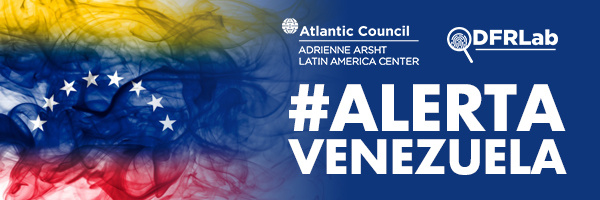#AlertaVenezuela is leading the way in identifying, exposing, and explaining disinformation within the context of one of the Western Hemisphere’s largest crises in recent history, where the fight for control of the information space will continue to pose a challenge for the region.
Top Story
Twitter network used artificial amplification to amplify anti-Guaidó hashtags
A Twitter network previously reported by the DFRLab used random text, including snippets of poems, song lyrics, articles, and Wikipedia entries, to amplify anti-Guaidó hashtags on Twitter. The random text appeared to be unrelated to Guaidó and to the hashtags. The network’s actions suggest they engaged in inauthentic behavior to make the hashtags seem more popular than they were in an attempt to influence or manipulate the trending topics on Twitter.
The posts that included random text increased the volume of mentions of the hashtags, one of the indicators Twitter considers in determining trends on the platform. The hashtags used by the network subsequently reached the trending topics, thus potentially having an impact on the conversation on social media and narratives against both Juan Guaidó and the Venezuelan opposition coalition.
The network had previously amplified anti-Guaidó hashtags in the aftermath of the Venezuelan National Assembly’s January 5 vote on the presidency of the legislative body. The network is formed by about 100 accounts, some exhibiting features of automation.
Most of the hashtags that accompanied the random text appeared in response to stories about Guaidó published by media outlets and on social media. The reactions by the network appeared around Guaidó’s international tour that kicked off in Colombia in January and the interim government’s announcement that they would appoint a presidential commission to oversee the restructuring of the Maduro regime-backed broadcaster Telesur on January 12.
It is difficult to say why the accounts decided to use random text in their posts instead of simply using the hashtags with no text at all. One possibility is that, by using random text, they were trying to bypass Twitter rules that ban platform manipulation, including attempts to undermine the public conversation and activity based on repeated actions (e.g., using the hashtag repeatedly). Thus, the intention of using tweets with text, rather than only the hashtags, might have been to convey that the posts were part of an organic conversation, rather than pure spam.
The DFRLab analyzed 19 hashtags posted by the network between January 4 and January 26, 2020. The hashtag used most often was #HastaNuncaWaido (#SeeYouNeverWaido) posted on January 5, 2020, the day of the election for the presidency of the National Assembly, followed by #YRctvWaido (#AndRctvWaido – RCTV refers to Radio Caracas Television) posted on January 12, after Guaidó announced his intention to restructure Telesur. “Waido” appears to be a pejorative spelling of “Guaidó.”
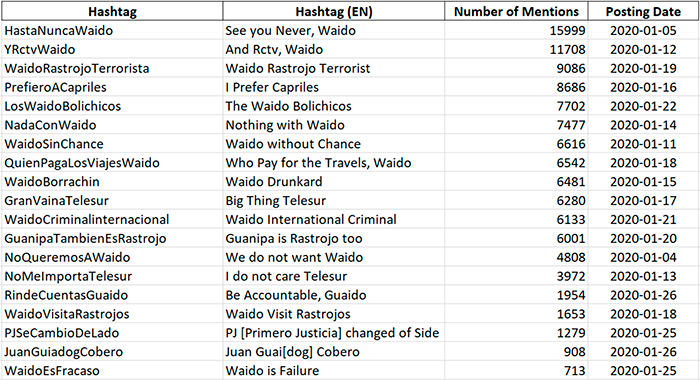
Among the text most frequently used alongside the hashtags were articles and fragments of poems. Some posts also included Wikipedia entries and song lyrics.
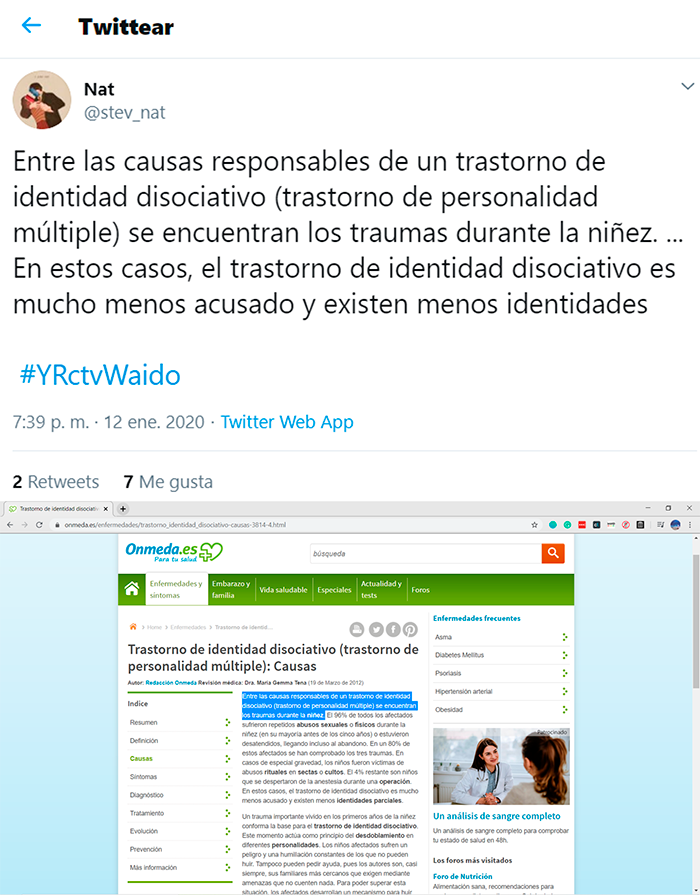
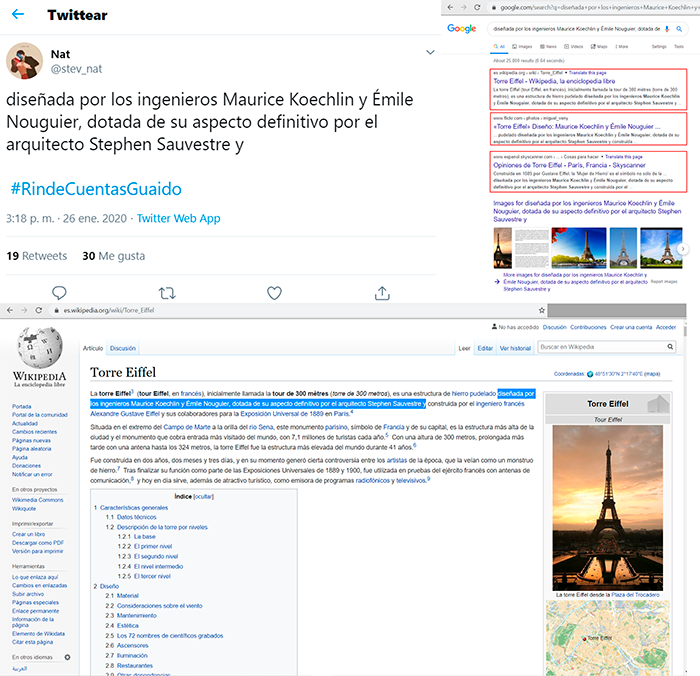
(Source: @stev_nat/archive, top; Wikipedia, bottom)
The accounts that are part of the network published tweets containing the hashtags but later deleted them. In addition, some accounts have changed their handles. Based on an account’s Twitter ID, a unique number attributed to each account that does not change if an account changes its handle, the DFRLab determined that at least 25 accounts changed their handles between January 5 and January 26. By February 3, some accounts belonging to the network had been either suspended by Twitter or deleted.
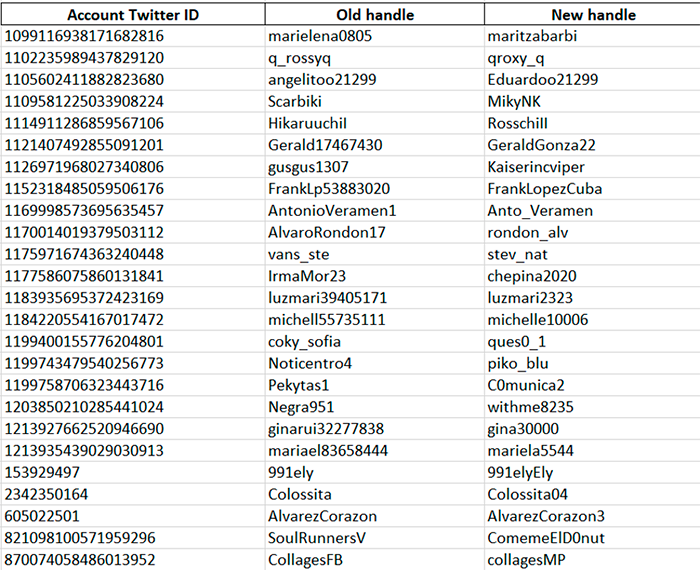
The DFRLab will continue to analyze the behavior of this network.
Talk of the Country
In the media
On January 28, 2020, Colombian broadcasting website Canal RCN published “Perú expulsa a 131 venezolanos con antedecentes criminales” (“Peru expels 131 Venezuelans with criminal records”), which reported on the capture and deportation of a group of Venezuelans, all of whom – according to Peruvian authorities – allegedly had a criminal record in Venezuela. This piece was one of the articles about Venezuela that garnered a high volume of interactions on social media between January 28 and February 3, according to a BuzzSumo query. The article reached 100,900 engagements on Facebook and Twitter combined. Even though the deportations took place in Peru, Colombian outlets such as radio station Bluradio also covered the news and garnered high numbers of interactions on social media. Colombia has received the most migrants from Venezuela – around 1.6 million, according to Colombian authorities. Per the United Nations, around 4.6 million Venezuelans have left the country since 2015.
In Venezuela, independent media outlet Efecto Cocuyo published an interview on January 29, 2020, “‘No pueden abordar a Diosdado Cabello, no le pueden preguntar nada’, dijo militar a periodista en la AN” (“’You cannot approach Diosdado Cabello, you can’t ask him anything,’ a military man told a journalist in the National Assembly”) with journalist Mildred Manrique. The journalist said she was detained for 45 minutes in the Palacio Federal Legislativo (“Federal Legislative Palace,” also known as the Capitolio) after trying to interview Diosdado Cabello, president of the pro-Maduro Constituent National Assembly and Maduro’s second-in-command. Manrique asked Cabello about the case of a former Colombian politician who was arrested in Venezuela. The journalist said Cabello dismissed her question and, after that, the chief of security of the Legislative Palace took her to an office. He told her she could not ask Cabello questions and that she was prohibited from entering the Federal Legislative Palace again. She was released after around 45 minutes. Manrique followed up the interview with a tweet stating that “intimidation means being approached, locked in an office, and treated as if you were doing something wrong. Asking is not a crime!”
What’s Trending
On Social Media
The phrase “Comando Sur” (“Southern Command”) trended on Twitter on January 31, after U.S. Navy Admiral Craig S. Faller, Commander of U.S. Southern Command, spoke to the Senate’s Armed Services Committee on January 30 against the “illegitimate Maduro dictatorship.” In January, Colombian and U.S. forces conducted a joint military exercise, which was seen as a threat by the Maduro regime.
The expressions that were most commonly used along with “Comando Sur” were “Necesitamos la presencia militar” (“We need military presence”) and “única forma de atacar este círculo” (“only way to attack this circle”), with more than 8,000 mentions each. They first appeared on January 30 in a post by the account @Maihen, which describes itself as an accountant and journalist investigating “‘red corruption’ in Venezuela,” a combined reference to the interference of China, Russia, and Cuba in Venezuela, all of which are or were communist in the relatively recent past.
The tweet, however, was misleading, as it did not fully translate what Faller said. Speaking about the situation in Venezuela, Faller said: “The only way to attack this vicious circle is as a team. In this neighborhood, a little goes a long way, and our partners are willing to contribute. But we need the right and focused, persistent military presence.” The translation of the post to Spanish published by @Maihen, nonetheless, omitted the word “persistent”, which made many believe that Faller was suggesting a military intervention in Venezuela, as can be seen in the replies to Maihen’s tweet.

Official Statements
“Atentos a próximas convocatorias porque estamos preparando nuestro regreso a Venezuela en los próximos días. Sueño con el regreso de nuestra gente y por eso vamos a seguir luchando. Agradezco esta oportunidad que tuvimos de estar en familia. Gracias, #Miami.”
“Watch for upcoming calls, because we are preparing our return to Venezuela in the coming days. I dream of the return of our people [to Venezuela], and that is why we will continue fighting. I appreciate this opportunity we had of being together as a family. Thank you, #Miami.” – Juan Guaidó, president of the National Assembly who is recognized by more than 60 countries as interim president of Venezuela, on Twitter on February 1. On January 18, Guaidó embarked on an international tour to visit governments from the Americas and Europe.
“Venezuela NO es miembro de la OEA. El Gobierno de la República Bolivariana de Venezuela no ha invitado o aceptado visita de delegación alguna de la CIDH [Comisión Interamericana de Derechos Humanos]. La visita anunciada en medios NO está autorizada.”
“Venezuela is NOT a member of the OAS [Organization of American States]. The Government of the Bolivarian Republic of Venezuela has not invited or accepted a delegation from the IACHR [Inter-American Commission on Human Rights]. The visit announced in the media is NOT authorized.” – Jorge Arreaza, the Maduro regime’s minister of foreign affairs on his Twitter account on January 31, after Guaidó invited the IACHR to visit the country. On February 4, IACHR said its delegation was held at the Panama airport, because the Maduro regime had notified the airline that the flight would not be allowed to land in Caracas. As a work around, IACHR announced that it would meet with victims of the Maduro regime and Venezuelan organizations on the Colombian border.
Our Team in the News
Following a visit to the Atlantic Council for an event on January 31, Carlos Paparoni shared snippets of the event clips, which included comments by Latin America Center Associate Director Diego Area, on his official Twitter account. The posts received over 420 retweets and over 430 likes.
The official account of the interim presidency of Venezuela shared a video of the Adrienne Arsht Latin America Center event on Instagram. In 24 hours, the post garnered over 3,333 views.
Recent Analyses
From the Adrienne Arsht Latin America Center: On Friday, January 31, the Adrienne Arsht Latin America Center hosted an event with Carlos Paparoni, Venezuelan National Assembly Representative and head of the Regional Office against Money Laundering and Corruption of Venezuela. Paparoni has been following the presence of terrorism and Hezbollah in Venezuela for over a year. He offered unique insights into how the international community can help prevent and combat the threat of international terrorism and organized crime more effectively in Venezuela and the region.
Subscribe to the #AlertaVenezuela newsletter
To receive future editions of the #AlertaVenezuela newsletter each week, sign up below!
